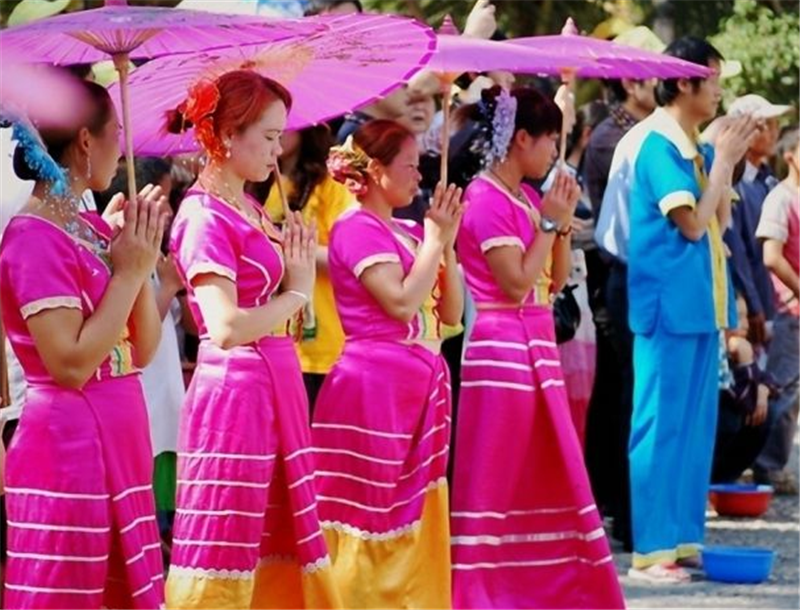Mangshi Culture
Ethnic culture
The original inhabitants of Mangshi plain are mainly Dai ethnic minority, an ethnic minority with a long history and civilization. The men are gentle and kind, and the women are elegant and hardworking. The mountainous residents are mainly Jingpo people. This is a minority that migrated from the Qinghai-Tibet Plateau in ancient times. They are brave and unrestrained. Here, travelers can dance with the elegant ethnic girls and play the drum with the strong boys. Dancing peacocks and beautiful songs will gain your attentions.
Dai, Jingpo, Lisu, Achang and De’ang live here generation by generation. These ethnic minority live cross border. They keep the trade contacts and cultural exchanges.
Festivals
1.The Water-splashing Festival is the traditional festival of Dai and De'ang nationalities, held on the New Year's Day in Dai Calendar in middle of April.
2.Munaozongge is the traditional festival of Jingpo Nationality. It used to be held during sacrifice offering and ceremony on 15th of the first month of each year.
3.The Kuoshi Festival is also called the New Year Celebrating Festival. It is a grand event of Lisu people, who, during the festival, male and female, old and young, dance and singing hand in hand for the whole night around a bonfire.
4.Aluwoluo Festival is the most important festival of Achang ethnic minority, deriving from ancient religious ceremony.
Religion
Hinayana Buddhism is the major religion in Mnagshi. Dai and De'ang ethnic minorities believe in it. The pagodas and Zhuangfang (temple in Dai villages) are built in every Dai villages, which are the typical architectures in Dehong. The representative architectures is the Menghuan Grand Golden Pagoda. Most of villages will pray in Zhuangfang and pagodas in certain time.
Jingpo people worship nature and their ancestors, which can be seen in their sacrifice ceremony.
Custom
Dai and Jingpo ethnic minorities are the major ones here.
At first, Dai ethnic minority live in the plain and they do well in agriculture. They like living in group and teamwork. They respect the old and cherish the young and help each other. In daily life, they are good at handicraft, like bamboo weaving and brocade. Dai ethnic minority favors dancing and singing which is necessary in ceremony, labor work and festivals.
Jingpo ethnic minority live among the mountain, so they have good hunting skill. The sword is taken with the men all the time. Brocade and embroidery are the necessary skill of Jingpo girls. All of their dress are made by themselves. The colorful and unique dresses are their best work. They worship the nature and their ethnic hero. The goup dancing in Munaozongge Festival represents Jingpo’s enthusiasm and solidarity.
Costume
Dai people:the traditional men clothes include open-front coat with tight sleeves and no collar, long loose trousers, and a pink, green or white turbans. In addition, Dai men carry satchels at their sides and carry swords at the girdle.Women clothes include open-front coat with tight sleeves and loop laps and sarong. Their waistbands are usually silver ones.
Jingpo people:there are daily costume, festival costume and ritual costume. Women’ daily costume consists of a collarless blouse, colorful skirts, bags, earrings etc., and men’ s daily costume consist of white or blue-purple cloth turbans, round-collar shirts, short black trousers, bags and swords. They will add more decoration and accessory to the festival and ritual costume.

 7 Days GolfingTour
7 Days GolfingTour
 8 Days Group Tour
8 Days Group Tour
 8 Days Yunnan Tour
8 Days Yunnan Tour
 7 Days Shangri La Hiking
7 Days Shangri La Hiking
 11 Days Yunnan Tour
11 Days Yunnan Tour
 6 Days Yuanyang Terraces
6 Days Yuanyang Terraces
 11 Days Yunnan Tour
11 Days Yunnan Tour
 8 Days South Yunnan
8 Days South Yunnan
 7 Days Tea Tour
7 Days Tea Tour
 8 Days Muslim Tour
8 Days Muslim Tour
 12 Days Self-Driving
12 Days Self-Driving
 4 Days Haba Climbing
4 Days Haba Climbing
 Tiger Leaping Gorge
Tiger Leaping Gorge
 Stone Forest
Stone Forest
 Yunnan-Tibet
Yunnan-Tibet
 Hani Rice Terraces
Hani Rice Terraces
 Kunming
Kunming
 Lijiang
Lijiang
 Shangri-la
Shangri-la
 Dali
Dali
 XishuangBanna
XishuangBanna
 Honghe
Honghe
 Kunming
Kunming
 Lijiang
Lijiang
 Shangri-la
Shangri-la
 Yuanyang Rice Terraces
Yuanyang Rice Terraces
 Nujiang
Nujiang
 XishuangBanna
XishuangBanna
 Spring City Golf
Spring City Golf
 Snow Mountain Golf
Snow Mountain Golf
 Stone Mountain Golf
Stone Mountain Golf









